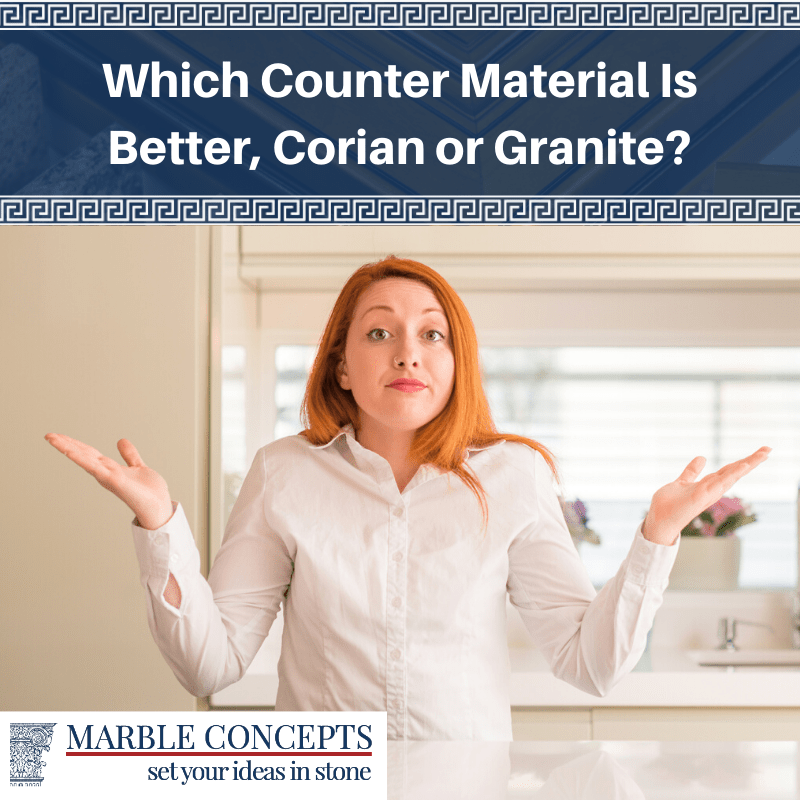When it comes to counter material, consumers have a number of terrific choices. Granite and Corian countertops are exceptionally popular with home builders and residential homeowners alike. Both of these counter selections each have pros and cons to consider before determining which is right for your specific counter needs.
Things To Consider Before Purchasing Counter Materials
There are some important considerations to review prior to picking a counter material. These include desired look and appearance, costs of material and installation, amount of maintenance you are willing to do, home resale value, where the counter material will be placed, strength and long term durability to name just a few.
Granite Countertops
Granite is a natural stone that is taken from rock quarries and cut into larger blocks of stone. Afterward, these stone blocks are expertly cut into slabs. The stone is then polished to bring out its beautiful shine.
Appearance:
Natural stones like granite each have their own unique color patterns, natural striations and other stone characterizing traits. These can vary dramatically from one slab of granite to another. The end result is often a more rustic and authentic stone look that is not perfectly uniform. Instead, granite appears somewhat wilder in appearance than engineered countertop materials like Corian.
Granite, once polished, can be simply gorgeous with its natural swirls, veins, freckles, dots, and other unique stone striations. Every homeowner will have their own style preferences, and some may avoid granite as their counter material choice because it can seem somewhat loud and busy if the natural stone patterns are too irregular or bold. It can be a bit difficult to predict the actual appearance of the granite slabs prior to completion of the job.
This authentic stone is also porous, and granite used in countertops require sealing before use to help prevent stains from becoming embedded in the stone’s porous layers.
Maintenance Requirements:
Since granite is a natural stone with a porous nature, this material can absorb liquids, gases and stains that can seep below surface level. In addition, the porous character can allow harmful bacteria and other germs to become trapped in these pores and spaces within the stone. Due to this, granite is required to be sealed with a protective finish that helps to keep germs, liquids and substances that stain on top allowing the surface to be thoroughly cleaned and sanitized.
Granite is not as difficult to clean and maintain than some other countertop material choices such as marble or some types of tile. Kitchen countertops will need ongoing maintenance to keep the finish intact, shiny and protective.
Like other natural stone materials, granite countertops should be regularly cleaned to help prevent stains and other damage. The sealant should be reapplied when signs of wear are evident usually every few years or so. Consumers should keep in mind that some types of granite may require more frequent resealing as early as every 6 months to 1 year. Always inquire about the specific maintenance and sealing requirements from a granite specialist before making a purchase.
Durability Factors:
As granite is a natural quarried stone, it can be susceptible to chips and cracks if treated harshly. When granite is properly sealed, the chances for surface and edge damage is lessened immensely. Granite can withstand greater heat temperatures from hot pots and pans when they are placed on the counter before they cool down. However, owners should take care not to expose the stone to extremes in temperature as this can cause fissures and cracks.
When treated correctly and sealed as directed, your granite countertops should last for about 25 to 50 years making it a good investment that will be enjoyed for years and decades to come.
Corian Countertops
Like quartz and some other counter materials, Corian is an engineered stone. It contains both natural stone particles blended with a higher concentration of acrylic polymers mixed with resins. The ratio is roughly 66% natural stone material with 33% engineered materials.
This material was first developed in the late 1960’s by DuPont and was extremely popular with homeowners and builders in the 1970’s and 1980’s as the end effect was more streamlined and uniform in color and patterns.
Appearance:
Corian is made from hot melted liquid materials that are carefully poured into various molds that transform into sheets of beautifully uniform colored and style patterned countertop sheets after they cool down.
Corian can be found in a number of gorgeous rich shades that can have sparkly stone bits visible giving the surface more depth than standard laminate counter materials that have a distinctive cheap plastic appearance.
A huge benefit of using Corian for counters is that sections and seams are drastically minimized. Consumers should note that while beautiful, Corian will be softer and displays a matte surface.
Maintenance Requirements:
Corian has minimal maintenance requirements, and this is why it is so popular with home builders and other consumers. As this engineered material is softer on the surface than some other materials, greater care should be taken as dings and scratches can occur otherwise.
Manufacturers recommend cleaning Corian with a gentle soap and cloth after use. Sinks should be washed thoroughly at least once a week to remove food and stain buildup.
Durability:
This material is also prone to scorching from hot pans and may be damaged when harsh cleaning products are used.
Cost Considerations:
The cost of granite will vary depending on slab and thickness, area of the size where granite will be installed, surface finishing and installation costs. Count in the initial installation charges and future refinishing requirement cost for a realistic cost expectation.
In comparison, Corian is much cheaper in price than granite and other luxury stones. This material is often practical for secondary spaces like laundry rooms or a basement bathroom.
Conclusion:
Both granite and Corian make outstanding countertop surfaces. Consumers should take time to consider their style preferences, maintenance requirements, and costs before buying. For assistance, fill out our contact form.






